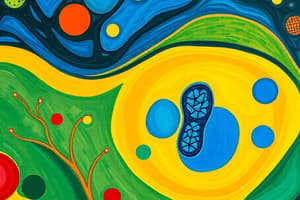Podcast
Questions and Answers
What is the main focus of molecular biology?
What is the main focus of molecular biology?
- Interconnections between ecosystems
- Evolution of species
- Biochemical processes within living organisms (correct)
- Structure of cells
Which statement best describes cell theory?
Which statement best describes cell theory?
- All cells contain hereditary information.
- Cells are the basic unit of life, and all cells arise from pre-existing cells. (correct)
- Only single-celled organisms are made up of cells.
- All living organisms can survive without cells.
What is the primary mechanism of evolution?
What is the primary mechanism of evolution?
- Gene flow
- Mutation
- Natural selection (correct)
- Genetic drift
Which level of biological organization includes groups of similar cells performing specific functions?
Which level of biological organization includes groups of similar cells performing specific functions?
What process maintains stable internal conditions in an organism?
What process maintains stable internal conditions in an organism?
Which of the following best represents the concept of metabolism?
Which of the following best represents the concept of metabolism?
What method involves formulating and testing predictions in biology?
What method involves formulating and testing predictions in biology?
Which level of biological organization is considered the global sum of all ecosystems?
Which level of biological organization is considered the global sum of all ecosystems?
Flashcards are hidden until you start studying
Study Notes
Overview of Biology
- Biology is the scientific study of life and living organisms.
- It encompasses various fields that study the structure, function, growth, evolution, distribution, and taxonomy of organisms.
Branches of Biology
- Molecular Biology: Focuses on the biochemical processes within living organisms.
- Cell Biology: Studies the structure and function of cells.
- Genetics: Examines heredity, gene function, and variation.
- Evolutionary Biology: Explores the origins and changes of species over time.
- Ecology: Studies interactions between organisms and their environments.
- Physiology: Investigates the functions and systems of living organisms.
Fundamental Concepts
-
Cell Theory:
- All living organisms are composed of cells.
- Cells are the basic unit of life.
- All cells arise from pre-existing cells.
-
Evolution:
- Change in the heritable traits of biological populations over successive generations.
- Natural selection is a key mechanism.
-
Homeostasis:
- The ability of organisms to maintain stable internal conditions despite external changes.
-
Metabolism:
- Sum of all chemical reactions in an organism that maintain life.
- Divided into anabolic (building up) and catabolic (breaking down) processes.
Levels of Biological Organization
- Molecular Level: Includes atoms, molecules, and macromolecules.
- Cellular Level: Deals with cells as the basic unit of life.
- Tissue Level: Groups of similar cells performing a specific function.
- Organ Level: Structures composed of different tissues working together.
- Organ System Level: Groups of organs that perform closely related functions.
- Organism Level: Individual living entities.
- Population Level: Groups of the same species living in a particular area.
- Community Level: Different species interacting in a specific area.
- Ecosystem Level: A community plus its physical environment.
- Biosphere Level: The global sum of all ecosystems; the zone of life on Earth.
Methods of Study
- Observation: Gathering data through visual or experimental means.
- Hypothesis Testing: Formulating and testing predictions to understand biological phenomena.
- Experiments: Conducting controlled tests to explore relationships between variables.
- Field Studies: Researching organisms in their natural habitats.
Importance of Biology
- Understanding fundamental life processes.
- Impact on health, medicine, and environmental sustainability.
- Informing conservation efforts and biodiversity.
- Advancements in biotechnology and genetic engineering.
Careers in Biology
- Research Scientist
- Healthcare Professional (e.g., Doctor, Nurse)
- Environmental Scientist
- Biotechnologist
- Educator (Teacher/Professor)
Current Trends in Biology
- Genomics and bioinformatics.
- CRISPR and gene editing technologies.
- Climate change effects on biodiversity.
- Synthetic biology and bioengineering advancements.
Biology: An Overview
- The scientific study of life and living organisms, encompassing their structure, function, growth, evolution, distribution, and classification.
Branches of Biology
- Molecular Biology: Biochemical processes within organisms.
- Cell Biology: Structure and function of cells.
- Genetics: Heredity, gene function, and variation.
- Evolutionary Biology: Species origins and changes over time.
- Ecology: Interactions between organisms and their environment.
- Physiology: Functions and systems of living organisms.
Fundamental Biological Concepts
- Cell Theory: All life is cellular; cells are the basic functional units; all cells arise from pre-existing cells.
- Evolution: Heritable trait changes in populations across generations; driven by mechanisms like natural selection.
- Homeostasis: Maintaining stable internal conditions despite external changes.
- Metabolism: The sum of all chemical reactions sustaining life, including anabolic (building) and catabolic (breaking down) processes.
Levels of Biological Organization
- Molecular: Atoms, molecules, macromolecules.
- Cellular: Individual cells.
- Tissue: Groups of similar cells with a shared function.
- Organ: Different tissues working together.
- Organ System: Groups of organs with related functions.
- Organism: An individual living entity.
- Population: Organisms of the same species in a given area.
- Community: Different species interacting within an area.
- Ecosystem: A community and its physical environment.
- Biosphere: The global sum of all ecosystems; Earth's life zone.
Biological Research Methods
- Observation: Data gathering through visual or experimental means.
- Hypothesis Testing: Formulating and testing predictions.
- Experiments: Controlled tests to explore variable relationships.
- Field Studies: Research in natural habitats.
The Importance of Biology
- Understanding fundamental life processes.
- Impact on health, medicine, and environmental sustainability.
- Informing conservation and biodiversity efforts.
- Driving advancements in biotechnology and genetic engineering.
Careers in Biology
- Research Scientist
- Healthcare Professionals (Doctors, Nurses, etc.)
- Environmental Scientist
- Biotechnologist
- Educator (Teachers, Professors)
Current Trends in Biology
- Genomics and bioinformatics.
- CRISPR and gene editing technologies.
- Climate change impacts on biodiversity.
- Synthetic biology and bioengineering advancements.
Studying That Suits You
Use AI to generate personalized quizzes and flashcards to suit your learning preferences.




